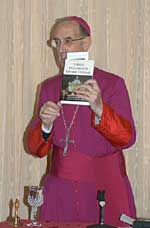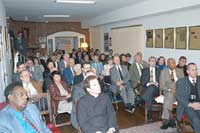
“Amid the storms through which She passes today, She [the Church] could proudly and tranquilly say: ‘Alios ego vidi ventos; alias prospexi animo procellas’ (‘I have already seen other winds, I have weathered other storms’). The Church has fought in other lands, against adversaries from among other peoples, and she will undoubted continue to face problems and enemies quite different from those of today until the end of time.”
Bishop Juan Rodolpho Laise quoted these words of the TFP founder, Professor Plinio Corrêa de Oliveira at the beginning of his talk, “A Capuchin Bishop Reflects on the Crisis in the Church.” It set the tone for an evening of conversation and thought at the American TFP Washington Bureau October 15.
Bishop Laise emphasized that persecution has been the normal state of the Church throughout Her history. Thus, it is imperative that Catholics learn to face persecution with strength and serenity.
He affirmed that this is why he has a great respect for Prof. Plinio Corrêa de Oliveira and the members of the TFP. “There is something that I admire in this movement (TFP) here in the United States, as in Europe, Brazil, Argentina,” Bishop Laise said. “Wherever they are, its members confront adversity with fortitude. This is not easy, but it shines through, even when facing incomprehension.”
He continued, relating his own experiences of fortitude in the diocese of San Luis, Argentina, where he served as bishop from 1971 until his retirement in 2001.

When Bishop Laise first arrived, the diocese had only one seminarian and had not ordained a priest in 18 years. Through painstaking efforts and limitless confidence, he began to traverse a long hard road. By the time he retired, the diocese had a huge seminary with 50 seminarians and 65 young, newly-ordained priests. Throughout all his struggles he was inspired by the words of Our Lord: “Seek ye therefore first the kingdom of God, and his justice, and all these things shall be added unto you.” (Matt. 6:33)
He recounted a touching story of his confidence in the Blessed Mother. After traveling to Fatima, he bought a small statue of Our Lady. Once a month he would process, together with 100-150 faithful, through the streets of San Luis with the statue, praying the rosary. During the procession he would walk behind the statue of the Virgin, beseeching her: “Open the way! Open the way!” And open the way she did.
One point he stressed was the necessity to oppose relativism, which Cardinal Ratzinger dubbed, “the greatest evil of our days.” He emphasized that his success was not due to watering down truth to make it palatable to the mainstream, but rather in forcefully presenting the truth in all its splendor. Thus, during his reign, he published 15 short catechisms and never shied away from taking unpopular stands.
One exemplar stand was his refusal to allow communion in the hand. Bishop Laise studied the issue in detail and even published a book supporting his position. After a long and difficult struggle, with the support of Cardinal Ratsinger, he prevailed and, to this day, communion is only given in the traditional way, on the tongue, in the diocese of San Luis, Argentina.
When the evening ended, those who had attended left refreshed. They had seen a bishop who maintained his orthodoxy, despite the pressure that the “prophets of change” exert on all those who oppose their progressive agenda.
They left refreshed and firmly committed to seek first the kingdom of Heaven, confident that if they do, everything else shall be added unto them.

